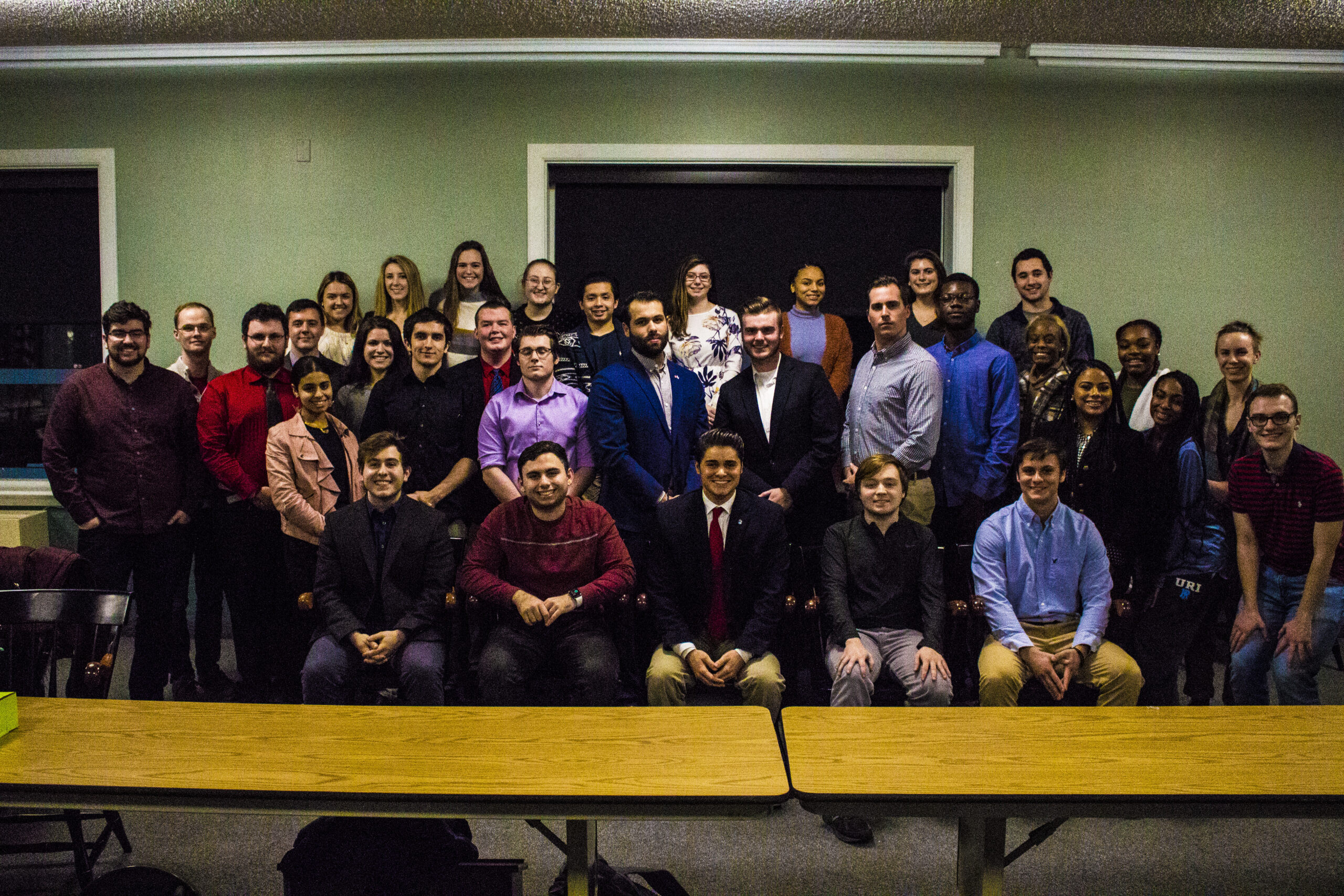Full Student Senate poses for a picture after meeting. Photo by James McIntosh.
The University of Rhode Island Student Senate welcomed President David Dooley yesterday for a presentation on URI’s budget.
Dooley announced to the Senate that the University is expecting to collect $10 million more from revenue over the next academic year. This is 2.9 percent more than they are currently collecting. The University will be raising the cost of tuition by that percentage.
“If you want to offer the same things next year that you’re offering this year, you’re going to have to spend 2 to 3 percent more,” Dooley said. “It’s inevitable.”
Dooley noted that the raise in tuition will be met with an equal raise in student aid.
“We want to keep our education as affordable as possible, especially compared to our peers,” Dooley said.
According to Dooley, achieving enrollment goals is “the most important thing” for keeping the University more affordable.
Dooley and Vice President of Student Affairs Kathy Collins also announced plans for a combined Health and Counseling Center.
“We’re currently in the design completion phase, and we’ll be getting student input throughout the rest of the spring semester, and we do believe that sometime in the fall semester we’ll begin construction on the new Health and Counseling Center,” Collins said.
The center will be located across the street from Health Service’s Potter Building currently resides and is expected to cost $58.7 million.
There are also plans to renovate the Memorial Union in the near future, an expected cost of $112 million.
Dooley also stressed the differences between the unrestricted portion of the school’s allocation budget and the restricted portion. Emphasizing that the two “could not be intermixed,” Dooley went over why the school was looking mainly at spending money for academic facilities, and why there were no plans for new housing buildings in the near future.
Unlike academic buildings, which are part of the unrestricted budget and therefore would be easier to allocate funds for, other buildings would have to come from the restricted budget.
“Housing and dining, for example, and healthcare, have to generate enough money to take care of everything,” Dooley said. “Not just paying all the people, but every piece of equipment. That is required by law.”
Both Dooley and Collins explained that the costs for recently built academic buildings came partly from the state’s government as well.
Dooley also announced that a new “URI Online” program is in the works. Through this program, students could complete a four-year degree from the University completely online. According to Dooley, a new undergraduate online major in communications studies will be offered. The University will also offer graduate programs in healthcare management, business analytics, supply chain management and natural resources in environmental sciences.
According to Dooley, Gov. Gina Raimondo agreed to provide $1.8 million per year for three years “specifically for online degree programs at the University of Rhode Island.”
In addition, the Senate passed two bills. One of the bills that was passed called on the University to adopt a uniform definition for domestic and dating violence. Senator Donna Osgood, the bill’s sponsor, brought this bill to the floor the prior week, but it was pushed back due to what was described as “problems with the bill’s structure” by multiple senators. This time, however, the bill passed unanimously, and Moderator Ryan McWeeney expressed his gratitude that the bill passed “quickly and without controversy.”
Additionally, the Senate voted to dissolve the Student Payroll Committee within the Senate. In the prior meeting, former Senator Ryan Menard spoke before the Senate, saying that the committee had served its purpose and was now extemporaneous. The vote to dissolve the committee was unanimous.





